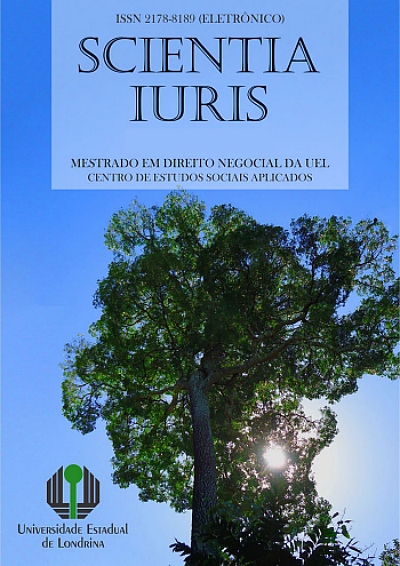Microssystem of environmental law: formation and operability
DOI:
https://doi.org/10.5433/2178-8189.2018v22n2p148Keywords:
Environmental law. Legal microsystem. Diffuse rights. Collective protection of rights.Abstract
Our modern legal system was built from large and traditional codifications of private law, with the objective of safeguarding individual liberties and rights. Furthermore, with the formation of mass society, mass conflicts have emerged, demanding that the law responds and adapts to these challenges accordingly. In retrospect, the traditional legal system was designed to resolve individual conflicts, thusly, it is no surpise that it does not provide adequate means for solving collective conflicts. From this perspective, isolating these new category of rights - diffuse rights - demands that law, with its distinguished conformations, adresses this issue in order to bring forth a solution. For this purpose, this research investigates possible alternatives constucted by our own legal system as a way to disentangle complex questions originating from diffuse conflicts - utilizing the paradigm shift as a probable means of solution, even if it derives from the microsystem whose point of departure is the environment. Moreover, the likeliness of answering these questions is directly related to the paradigmatic and systemic re-reading, as capable means of adequatly guaranteeing this segmant's demands, as noted by the difficulties faced by the operators of the law with regard to the appropriate treatment of conflicts that involve the right to property, free enterprise and the protection of natural resources. Finally, this paper uses the deductive and finalistic method, based on literature review, with the purpose of relating it to the environment. In conclusion, this paper verified the indispensability of differential treatment for conflicts pertaining to environmental law, as a means to fulfill the legal duties of this area.
Downloads
Downloads
Published
How to Cite
Issue
Section
License
Copyright (c) 2022 Scientia Iuris

This work is licensed under a Creative Commons Attribution 4.0 International License.
The journal reserves the right to modify, in the original text of the submitted article, normative, spelling and grammatical mistakes in order to maintain the cultured standard of language and the credibility of the journal. The journal will respect the authors' writing style. Changes, corrections or suggestions of conceptual order will be sent to the authors, when necessary. In such cases, the articles will be re-examined. The final exams will not be sent to the authors. The published works become the property of the journal, in other words, its total or partial reprinting is subject to the express authorization of the journal. In all subsequent citations, the original source of publication shall be cited and in the case of Photographic Speeches, shall be approved by the original author. The opinions expressed by the authors of the journal's articles are of their sole responsibility.

















